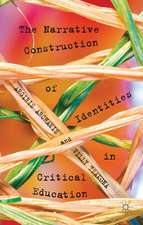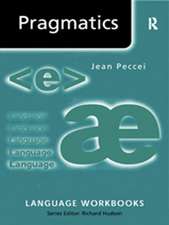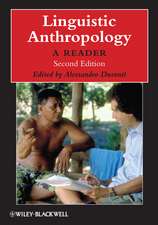Language in Late Capitalism: Pride and Profit: Routledge Critical Studies in Multilingualism
Editat de Alexandre Duchêne, Monica Helleren Limba Engleză Paperback – 7 iun 2013
| Toate formatele și edițiile | Preț | Express |
|---|---|---|
| Paperback (1) | 486.38 lei 43-57 zile | |
| Taylor & Francis – 7 iun 2013 | 486.38 lei 43-57 zile | |
| Hardback (1) | 1117.07 lei 43-57 zile | |
| Taylor & Francis – 17 oct 2011 | 1117.07 lei 43-57 zile |
Din seria Routledge Critical Studies in Multilingualism
-
 Preț: 371.71 lei
Preț: 371.71 lei -
 Preț: 311.66 lei
Preț: 311.66 lei -
 Preț: 310.37 lei
Preț: 310.37 lei - 21%
 Preț: 268.93 lei
Preț: 268.93 lei - 18%
 Preț: 899.08 lei
Preț: 899.08 lei - 20%
 Preț: 262.14 lei
Preț: 262.14 lei -
 Preț: 491.17 lei
Preț: 491.17 lei -
 Preț: 389.66 lei
Preț: 389.66 lei -
 Preț: 449.41 lei
Preț: 449.41 lei - 18%
 Preț: 1001.39 lei
Preț: 1001.39 lei -
 Preț: 449.41 lei
Preț: 449.41 lei -
 Preț: 389.66 lei
Preț: 389.66 lei - 18%
 Preț: 997.42 lei
Preț: 997.42 lei -
 Preț: 384.59 lei
Preț: 384.59 lei -
 Preț: 389.66 lei
Preț: 389.66 lei - 28%
 Preț: 740.82 lei
Preț: 740.82 lei -
 Preț: 445.38 lei
Preț: 445.38 lei - 18%
 Preț: 1000.61 lei
Preț: 1000.61 lei -
 Preț: 429.41 lei
Preț: 429.41 lei -
 Preț: 442.32 lei
Preț: 442.32 lei - 26%
 Preț: 847.73 lei
Preț: 847.73 lei -
 Preț: 436.14 lei
Preț: 436.14 lei -
 Preț: 390.63 lei
Preț: 390.63 lei - 18%
 Preț: 1001.87 lei
Preț: 1001.87 lei - 18%
 Preț: 1000.45 lei
Preț: 1000.45 lei -
 Preț: 487.37 lei
Preț: 487.37 lei - 18%
 Preț: 1001.39 lei
Preț: 1001.39 lei - 30%
 Preț: 847.34 lei
Preț: 847.34 lei -
 Preț: 388.72 lei
Preț: 388.72 lei - 18%
 Preț: 1010.26 lei
Preț: 1010.26 lei - 26%
 Preț: 848.54 lei
Preț: 848.54 lei - 18%
 Preț: 1000.27 lei
Preț: 1000.27 lei -
 Preț: 389.29 lei
Preț: 389.29 lei
Preț: 486.38 lei
Nou
Puncte Express: 730
Preț estimativ în valută:
93.07€ • 97.42$ • 77.46£
93.07€ • 97.42$ • 77.46£
Carte tipărită la comandă
Livrare economică 31 martie-14 aprilie
Preluare comenzi: 021 569.72.76
Specificații
ISBN-13: 9780415869966
ISBN-10: 041586996X
Pagini: 280
Ilustrații: 3 black & white illustrations, 3 black & white tables, 3 black & white halftones
Dimensiuni: 152 x 229 x 18 mm
Greutate: 0.39 kg
Ediția:1
Editura: Taylor & Francis
Colecția Routledge
Seria Routledge Critical Studies in Multilingualism
Locul publicării:Oxford, United Kingdom
ISBN-10: 041586996X
Pagini: 280
Ilustrații: 3 black & white illustrations, 3 black & white tables, 3 black & white halftones
Dimensiuni: 152 x 229 x 18 mm
Greutate: 0.39 kg
Ediția:1
Editura: Taylor & Francis
Colecția Routledge
Seria Routledge Critical Studies in Multilingualism
Locul publicării:Oxford, United Kingdom
Public țintă
Postgraduate and UndergraduateCuprins
1. Pride and profit: changing discourses of language, capital and nation-state Monica Heller and Alexandre Duchêne 2. Sociolinguistics regimes and the management of "diversity" Susan Gal 3. Commodification of pride and resistance to profit: language practices as terrain of struggle in a Swiss football stadium Alfonso Del Percio and Alexandre Duchêne 4. "Total Quality Language Revival" Jacqueline Urla 5. Literary tourism: new appropriations of landscape and territory in Catalonia Joan Pujolar and Kathryn Jones 6. Pride, profit and distinction: negotiations across time and space in community language education Adrian Blackledge and Angela Creese 7. War, peace and languages in the Canadian Navy Michelle Daveluy 8. Frontiers and Frenchness: pride and profit in the production of Canada Monica Heller and Lindsay Bell 9. The making of "workers of the world": language and the labor brokerage state Beatriz P. Lorente 10. Language workers: emblematic figures of late capitalism Josiane Boutet 11. Silicon Valley sociolinguistics? Analyzing language, gender and communities of practice in the new knowledge economy Bonnie McElhinny
Recenzii
'This volume is most suited for upper-level graduate students and researchers with backgrounds in sociolinguistics and a good grasp of economics, processes of globalization, and Bourdieusian Social Theory. Because of its prominent interdisciplinary and methodological diversity, scholars outside of sociolinguistics (and even the social sciences) may find it of benefit, as well. Perhaps one of the strongest attributes of the volume as a whole is its ability to maintain a unifying theme without adopting an overly-dogmatic stance in terms of pushing a unified theory. As a result, the authors offer their own analyses as models for continued investigation and critique, thus opening possibilities for continued fruitful research.' - Linguist List
"The authors effectively demonstrate the immensely complex nature of how 'pride' and 'profit' function, and also reveal how richly and powerfully pervasive these tropes are." —Philip T. Duncan, LINGUIST List
"This book offers a rich collection of case studies looking at how perceptions of, and approaches to, languages have shifted in recent years. […] The strength of this framework is that it encourages the reader to think critically about language in social and political context." —François Grin, Language Policy
"The book makes a significant contribution to understanding perspectives on language as we have moved from a primary language model with concerns for authenticity and language potential to a multilingual global society with ongoing concerns for authenticity and 'potential' monetized into value-added considerations."—Erik Aasland, Language in Society
"The authors effectively demonstrate the immensely complex nature of how 'pride' and 'profit' function, and also reveal how richly and powerfully pervasive these tropes are." —Philip T. Duncan, LINGUIST List
"This book offers a rich collection of case studies looking at how perceptions of, and approaches to, languages have shifted in recent years. […] The strength of this framework is that it encourages the reader to think critically about language in social and political context." —François Grin, Language Policy
"The book makes a significant contribution to understanding perspectives on language as we have moved from a primary language model with concerns for authenticity and language potential to a multilingual global society with ongoing concerns for authenticity and 'potential' monetized into value-added considerations."—Erik Aasland, Language in Society
Descriere
This book examines the ways in which our ideas about language and identity, which used to be framed in national and political terms as a matter of rights and citizenship, are increasingly recast in economic terms as a matter of added value. It argues that this discursive shift is connected to specific characteristics of the globalized new economy in what can be thought of as "late capitalism". Through ten ethnographic case studies, it demonstrates the complex ways in which older nationalist ideologies which invest language with value as a source of pride get bound up with newer neoliberal ideologies which invest language with value as a source of profit.























